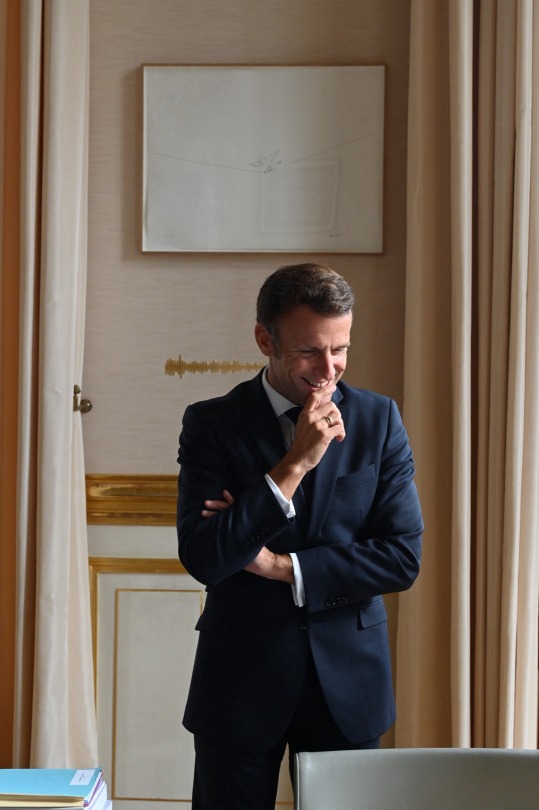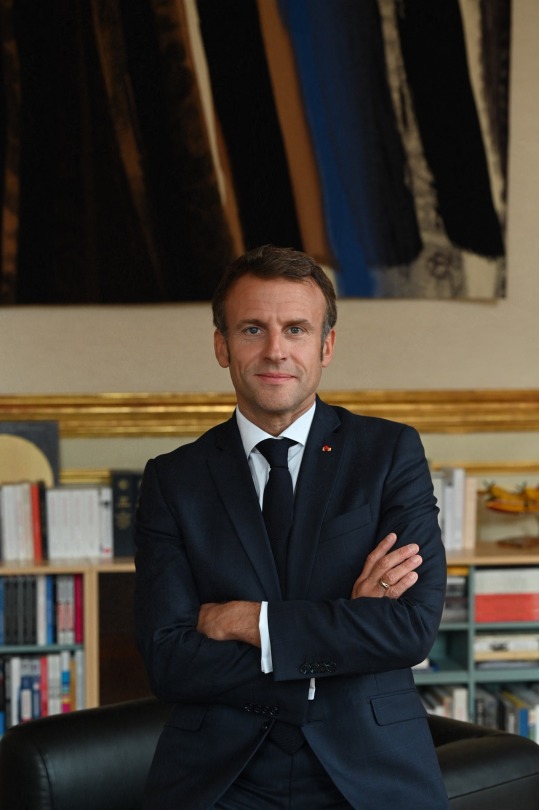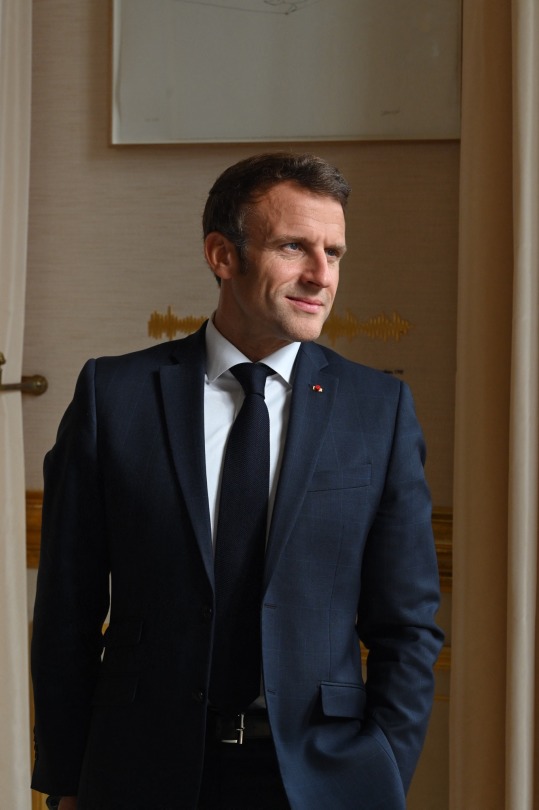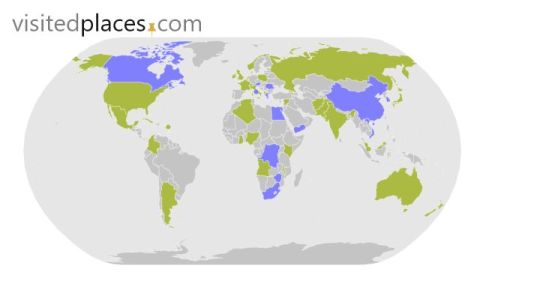#kamel daoud
Text


« Moi je sors exalté de cette expérience presque : je savais que j’avais raison quand, adolescent dans mon village, j’ai conclu que l’érotisme est la religion la plus ancienne, que mon corps est mon unique mosquée et que l’art est la seule éternité dont je peux être certain »
Kamel Daoud
#kamel daoud#le peintre devorant la femme#nuit au musee#picasso#auteur algerien#les-portes-du-sud#@kamel#mai 2023
17 notes
·
View notes
Quote
Ihre Schönheit tut mir in der Seele weh.
Kamel Daoud: “Der Fall Meursault - eine Gegendarstellung”, S.173
1 note
·
View note
Photo

Kamel Daoud
0 notes
Text
Love. What a strange feeling, right? It's like being drunk. You've lost your balance, your senses are dulled, but you've got this oddly precise and totally useless insight.
The Meursault Investigation by Kamel Daoud
1 note
·
View note
Text
The thing about Camus is if you think he didn’t care about life you didn’t read him write. He got tuberculosis at a young age, he was frail and ill, his deaf mother sent him to live with his uncle not because she didn’t love him but because she didn’t think she could be what he needed. Before the outsider he wrote story after story extract after extract about characters whose mothers are distance not through choice but circumstances. He loved every girlfriend and his mum and his friends and his country. When he calls alelgeria an insult he says it I’m only the way someone who calls it home can. He’s French but not raised there. He’s wanted to teach but wasn’t allowed due to his illness. He wrote plays and stories and political magazines. He supported liberation but detested violence. He lived no matter what. He died in a car crash too young. When he always thought he would die of illness. He faced death and that’s why he wrote the outsider. He wanted to life but felt like life had him on deaths row. I love him. I love the universe he invisions the happiness he dreams.
#albert camus#camus#aimeespeaks#the outsider#the myth of Sisyphus#I’m drunk again#I’ll actually reboot this with evidence when I’m sober again#but if you interested in what went into Camus writings#read Alice Kaplan#Alice Kaplan#she’s the leading expert in Camus right now#and a French professor in Yale#she’s so smart#she wrote a biography of the stranger (not Camus life but it touches on it often)#the stranger#also read the mersault investigation by kamel daoud
2 notes
·
View notes
Text
highlighting a few families from the operation olive branch spreadsheet
207 notes
·
View notes
Text
by Giulio Meotti
There were shameful scenes at a Women's Rights Day demonstration in Munich's Marienplatz. Palestinian flags everywhere. Israeli flags were not welcome. Left-wing and pro-Palestinian groups insulted and pushed several Jewish women. Among the participants was the president of the Jewish community of Munich, Charlotte Knobloch (a Holocaust survivor).
Same scenes in Paris. Insults, attempted aggression, threats, and throwing of projectiles, the pro-Israeli collectives had to be exfiltrated from the Paris demonstration organized on the occasion of International Women's Rights Day. "We heard slogans like 'dirty Jews,' 'Nazis,' 'Israeli murderers,'" Mélanie Pauli-Geysse, president of No Silence, told Le Point.
No media or feminist organization in Europe is following the testimonies reported by the survivors of the family of Abu Bakr al Baghdadi, the caliph of Daesh.
Eggs, broken bottles, rubber bullets. "It was then that the situation worsened, we were only able to walk a few minutes before being exfiltrated by the police for our safety."
In L'Express, Sarah Barukh wrote: "There were Iranian, Afghan, Israeli, Pakistani, Yazidi, and others. We denounce the devastation of apartheid imposed by radical Islamism. We stand alongside women who are victims of barbaric traditions such as excision, in France and elsewhere." Next to her, Mona Jafarian, who fled from Iran, and Father Desbois, a Catholic priest who returned from Ukraine and recounted his life with Yazidi women, his arrest in Iraq, and his death sentence in several countries designated as lands of Islam because "I expressed words of sympathy towards the Jews."
Meanwhile, the Algerian writer Kamel Daoud writes that no media or feminist organization in Europe is following the testimonies reported by the survivors of the family of Abu Bakr al Baghdadi, the caliph of Daesh. His daughter, his wives, his sexual slaves are interviewed on Saudi TV to talk about the caliph.
"No relaunch in newspapers or platforms, no analysis, no echo," writes Daoud. "Western neo-feminism, crumbling into particularisms, is indifferent to this 'Muslim' scene where the condition of millions of women parades, beyond digital screens and the effects of ideological bubbles."
A forced tour should then be immediately organized to the Hamas cages under Gaza where Hamas is holding Israeli female hostages. And for those who don't feel like it, there is still the exhibition in London in which the conditions of imprisonment of the Israelis were recreated based on the testimonies of those who were exchanged in November.
Nothing seems to interfere with the ideological excitement these old and perverse peacocks derive from a barbarism they mistake for rebellion.
There is a pathological reluctance across the West to believe that Hamas has raped and mutilated women. "It didn't happen" or "where is the proof?" The speed with which these people went from saying "believe women" and #MeToo to "show the rape photos or it didn't happen" is mind-blowing.
Rape denial is so widespread that some have felt compelled to take to the streets to raise awareness of Hamas's sexual crimes. British Jews and their (few) allies gathered near BBC headquarters to say "rape is not resistance." Some wore jogging bottoms with stains between the legs, in solidarity with Naama Levy, the 19-year-old Israeli woman seen in that very state shortly after the Hamas pogrom.
The West went from "believe women" to "believe terrorists."
Nothing seems to interfere with the ideological excitement these old and perverse peacocks derive from a barbarism they mistake for rebellion in an unholy marriage of Western self-loathing and Islamic Jihad. They are willing to do anything to save the most squalid moral vanity and be able to continue selling us their "goodness." Except that it is really evil.
47 notes
·
View notes
Text
2023 in books: fiction edition
literary fiction published 2013-2023 (based on English translation)
The Employees by Olga Ravn (⭐⭐⭐⭐⭐)
Detransition Baby by Torrey Peters (⭐⭐⭐⭐⭐)
When We Cease to Understand the World by Benjamín Labatut (⭐⭐⭐⭐⭐)
There’s No Such Thing As an Easy Job by Kikuko Tsumura (⭐⭐⭐⭐⭐)
Human Acts by Han Kang (⭐⭐⭐⭐⭐)
Bunny by Mona Awad (⭐⭐⭐⭐⭐)
Frankissstein by Jeanette Winterson (⭐⭐⭐⭐⭐)
All Your Children Scattered by Beata Umubyeyi Mairesse (⭐⭐⭐⭐⭐)
Mister N by Najwa Barakat (⭐⭐⭐⭐⭐)
Fever Dream by Samanta Schweblin (⭐⭐⭐⭐)
Gideon the Ninth by Tamsyn Muir (⭐⭐⭐⭐)
Brickmakers by Selva Almada (⭐⭐⭐⭐)
True Biz by Sara Nović (⭐⭐⭐⭐)
Abyss by Pilar Quintana (⭐⭐⭐⭐)
The Meursault Investigation by Kamel Daoud (⭐⭐⭐⭐)
Frankenstein in Baghdad by Ahmed Saadawi (⭐⭐⭐⭐)
Spring Garden by Tomoka Shibasaki (⭐⭐⭐⭐)
Rombo by Esther Kinsky (⭐⭐⭐⭐)
Concerning My Daughter by Kim Hye-Jin (⭐⭐⭐⭐)
The House of Rust by Khadija Abdalla Bajaber (⭐⭐⭐⭐)
Men without Women by Haruki Murakami (⭐⭐⭐)
The Sky Above the Roof by Natacha Appanah (⭐⭐⭐)
Sweet Bean Paste by Durian Sukegawa (⭐⭐⭐)
Luster by Raven Leilani (⭐⭐⭐)
Solo Dance by Li Kotomi (⭐⭐⭐)
Untold Night and Day by Bae Suah (⭐⭐⭐)
The Shadow King by Maaza Mengiste (⭐⭐⭐)
The Deep by Rivers Solomon (⭐⭐⭐)
Afterlives by Abdurazak Gurnah (⭐⭐⭐)
Wreck the Halls by Tessa Bailey
Indelicacy by Amina Cain (⭐⭐⭐)
Out of Love by Hazel Hayes (⭐⭐⭐)
Freshwater by Akwaeke Emezi (⭐⭐⭐)
The Reactive by Masande Ntshanga (⭐⭐⭐)
The Houseguest: And Other Stories by Amparo Dávila (⭐⭐)
The Glutton by A.K. Blakemore (⭐⭐)
Homebodies by Tembe Denton-Hurst (⭐⭐)
Nervous System by Lina Meruane (⭐⭐)
Owlish by Dorothy Tse (⭐⭐)
The President and the Frog by Carolina de Robertis (⭐⭐)
The Magic of Discovery by Britt Andrews (⭐)
literary fiction published 1971-2012
House of Leaves by Mark Z. Danielewski (⭐⭐⭐⭐⭐)
The Vampire Lestat by Anne Rice (⭐⭐⭐⭐⭐)
Corregidora by Gayl Jones (⭐⭐⭐⭐⭐)
Signs Preceding the End of the World by Yuri Herrera (⭐⭐⭐⭐⭐)
Changes: A Love Story by Ama Ata Aidoo (⭐⭐⭐⭐⭐)
Open City by Teju Cole (⭐⭐⭐⭐⭐)
The Lover by Marguerite Duras (⭐⭐⭐⭐⭐)
Mild Vertigo by Mieko Kanai (⭐⭐⭐⭐⭐)
Abandon by Sangeeta Bandyopadhyay (⭐⭐⭐⭐⭐)
Toddler Hunting and Other Stories by Taeko Kōno (⭐⭐⭐⭐⭐)
Parable of the Sower by Octavia E. Butler (⭐⭐⭐⭐)
Elena Knows by Claudia Piñeiro (⭐⭐⭐⭐)
Ceremony by Leslie Marmon Silko (⭐⭐⭐⭐)
Perestroika by Tony Kushner *a play (⭐⭐⭐⭐)
Strange Weather in Tokyo by Hiromi Kawakami (⭐⭐⭐⭐)
By Night in Chile by Roberto Bolaño (⭐⭐⭐⭐)
Drive Your Plow over the Bones of the Dead by Olga Tokarczuk (⭐⭐⭐⭐)
Three Strong Women by Marie NDiaye (⭐⭐⭐⭐)
Kingdom Cons by Yuri Herrera (⭐⭐⭐⭐)
Paradise Rot by Jenny Hval (⭐⭐⭐⭐)
The God of Small Things by Arundhati Roy (⭐⭐⭐⭐)
A Mountain to the North, A Lake to the South, Paths to the West, a River to the East by Laszlo Krasznahorkai (⭐⭐⭐⭐)
Interview with the Vampire by Anne Rice (⭐⭐⭐⭐)
Queen Pokou by Véronique Tadjo (⭐⭐⭐)
The Private Lives of Trees by Alejandro Zambra (⭐⭐⭐)
The Hour of the Star by Clarice Lispector (⭐⭐⭐)
Sweet Days of Discipline by Fleur Jaeggy (⭐⭐⭐)
Mr. Potter by Jamaica Kincaid (⭐⭐⭐)
Bluebeard’s First Wife by Ha Seong-nan (⭐⭐⭐)
The Body Artist by Don DeLillo (⭐⭐⭐)
Glaciers by Alexis M. Smith (⭐⭐⭐)
Curtain by Agatha Christie (⭐⭐⭐)
The Iliac Crest by Cristina Rivera Garza (⭐⭐⭐)
My Name Is Red by Orhan Pamuk (⭐⭐⭐)
The Dovekeepers by Alice Hoffman (⭐⭐⭐)
Like Water for Chocolate by Laura Esquivel (⭐⭐⭐)
Rashomon and Seventeen Other Stories by Ryūnosuke Akutagawa (⭐⭐)
Coraline by Neil Gaiman (⭐⭐)
The End of the Moment We Had by Toshiki Okada (⭐⭐)
The Optimist’s Daughter by Eudora Welty (⭐)
literary fiction published start of time-1970
Catch-22 by Joseph Heller (⭐⭐⭐⭐⭐)
🔁 The Stranger by Albert Camus (⭐⭐⭐⭐⭐)
The Heart Is a Lonely Hunter by Carson McCullers (⭐⭐⭐⭐⭐)
🔁 One Hundred Years of Solitude by Gabriel García Márquez (⭐⭐⭐⭐⭐)
The Posthumous Memoirs of Brás Cubas by Machado de Assis (⭐⭐⭐⭐⭐)
Empty Wardrobes by Maria Judite de Carvalho (⭐⭐⭐⭐⭐)
Stoner by John Williams (⭐⭐⭐⭐⭐)
The Chandelier by Clarice Lispector (⭐⭐⭐⭐)
An Apprenticeship, or the Book of Pleasures by Clarice Lispector (⭐⭐⭐⭐)
The Woman in the Dunes by Kōbō Abe (⭐⭐⭐⭐)
As I Lay Dying by William Faulkner (⭐⭐⭐⭐)
Nightwood by Djuna Barnes (⭐⭐⭐⭐)
Dracula by Bram Stoker (⭐⭐⭐⭐)
Chess Story by Stefan Zweig (⭐⭐⭐⭐)
Aura by Carlos Fuentes (⭐⭐⭐⭐)
Fathers and Sons by Ivan Turgenev (⭐⭐⭐)
All Passion Spent by Vita Sackville-West (⭐⭐⭐)
The Hole by José Revueltas (⭐⭐⭐)
Baron Bagge by Alexander Lernet-Holenia (⭐⭐⭐)
Carmilla by J. Sheridan Le Fanu (⭐⭐)
Barabbas by Pär Lagerkvist (⭐)
11 notes
·
View notes
Text
You drink a language, you speak a language, and one day it owns you; and from then on, it falls into the habit of grasping things in your place, it takes over your mouth like a lover’s voracious kiss.
The Meursault Investigation - 'Kamel Daoud'
3 notes
·
View notes
Text



5 September 2022, meeting with writer Kamel Daoud at the Élysée Palace
12 notes
·
View notes
Quote
Wie anstrengend es ist, zu leben!
Kamel Daoud: “Der Fall Meursault - eine Gegendarstellung”, S.191
1 note
·
View note
Text
« Je ne mérite pas le temps qui m'est donné. Il faut que je le mérite et si je ne le mérite pas, je suis dans la culpabilité. Le seul moyen de le mériter, c'est d'écrire, de décrire. J'ai l'impression que j'ai un devoir de mémoire en répertoriant, en écrivant, en se perpétuant, en dressant l'inventaire des nuances, des gens, des visages. C'est un mensonge que je me raconte, mais j'y tiens. J'ai l'impression de me sauver. »
Kamel Daoud
1 note
·
View note
Text
Reading Around the World Challenge
Read one book set in every country around the world
Ongoing
Total: 48/195
Setting and Author: 33/195
Setting Only: 15/195

The StoryGraph Challenge Link
My guidelines for this challenge:
Books should be set primarily or entirely in that country. (No travelogues counting for multiple countries.)
Fiction is preferred, but memoirs are acceptable. No history books.
Magical Realism and Fantasy are acceptable, so long as the country is named and recognizable. (No high fantasy inspired by the country.)
Authors should be from that country, living there for a majority or large portion of their lives and closely identifying with the country.
Diaspora and descendant authors are on a case-by-case, with the above criteria in mind.
Please feel free to send me suggestions!
I read primarily in English, but can also do intermediate Spanish, so I'm interested in adding some Spanish language books to the list.
Let me know if you disagree with my characterization of any authors or have suggestions for an author from a particular country.
Full list under the cut.
Setting and Author
Afghanistan - The Kite Runner by Khaled Hosseini
Not generally a fan of literary fiction, but I actually didn't hate this! A more hopeful ending than I expected.
Albania - The Ghost Rider by Ismail Kadare
This did not end at all how I expected. A quick and fascinating read.
Algeria - The Stranger by Albert Camus & The Meursault Investigation by Kamel Daoud
Interesting to read these two together, and glad to have the literary background, but not really my thing.
Angola - A General Theory of Oblivion by Jose Eduardo Agualusa, Trans. Daniel Hahn
A bunch of intertwined stories centered around Angola's independence and the following decades. I'm not sure I would call this magical realism, but it kinda has that feel to it.
Antigua and Barbuda - A Small Place by Jamaica Kincaid
Fascinating long essay that is a must read for tourists, particularly those traveling in the Caribbean.
Argentina - Mouthful of Birds by Samanta Schweblin
Collection of horror and adjacent short stories.
Armenia - Three Apples Fell from the Sky by Narine Abgaryan, translated by Lisa C. Hayden
A dying village on a mountain finds a reason to keep going. It's got that slight fairy/folktale feel to it that commonly gets called "magical realism."
Australia - The Things She's Seen by Ambelin and Ezekiel Kwaymullina
Surprisingly sweet and wonderfully clever. Really enjoyed this one!
Colombia - Love in the Time of Cholera by Gabriel García Márquez
I preferred 100 Years of Solitude, but this is the novel more firmly set in Colombia.
Cuba - The Tower of the Antilles by Achy Obejas
A volume of short stories exploring life in Cuba and in the US as an immigrant from Cuba. Not my favorite short story collection, but there were a couple that were really evocative.
France - The Count of Monte Cristo by Alexandre Dumas
Read an abridgement that made me want to go back and read the unabridged version. Liked this better than The Three Musketeers.
Ghana - Homegoing by Yaa Gyasi
Literary, but enjoyable! The back and forth twining of the storylines was used to really good effect.
India - A Suitable Boy by Vikram Seth
This is billed as a romance, but don't believe it. It's long, the links between the storylines aren't always clear, and it's a "realistic" ending.
Ireland - Dubliners by James Joyce
These are... meh? More like vignettes than short stories. And very "everyone is unhappy."
Italy - The Name of the Rose by Umberto Eco
This was really interesting! I feel like I need to read it again to really get all the twists and turns.
Japan - The Travelling Cat Chronicles by Hiro Arikawa
This was so sweet! And bittersweet. Just generally lovely.
Kenya - Unbowed by Wangari Maathai
An interesting memoir by a remarkable woman.
Malawi - The Boy Who Harnessed the Wind by William Kamkwamba and Bryan Meler
A fascinating story of how ingenuity, persistence, and small changes can profoundly change a community.
Malaysia - The Ghost Bride by Yangsze Choo
I really liked this one! A good spooky mystery with great fantasy/folklore elements.
Mexico - Mexican Gothic by Silvia Moreno-Garcia
Loved this book! Great horror story.
Netherlands - The Diary of a Young Girl by Anne Frank
Important, but sad work.
New Zealand - Quiet in Her Bones by Nalini Singh
Thriller filled with interesting if not always likeable characters and a somewhat unreliable narrator.
Nigeria - Noor by Nnedi Okorafor
Not my favorite of Okorafor's works, but a fascinating near-future sci-fi.
Norway - Kristin Lavransdatter by Sigrid Undset
Not a happy story, but well written and engrossing, even at over a thousand pages.
Pakistan - Unmarriageable by Soniah Kamal
A retelling of Pride and Prejudice set in Pakistan. I loved the way that Pakistani culture was woven through and enhanced the original plot and themes. A really good read!
Poland - Drive Your Plow Over the Bones of the Dead by Olga Tokarczuk
Interesting mystery if not ultimately quite my thing.
Russia - War and Peace by Leo Tolstoy
Yes, I did read the unabridged version. Yes, you should definitely find the abridged version.
Rwanda - Our Lady of Kibeho by Immaculée Ilibagiza
First hand accounts of a little known Marian apparition in Rwanda.
Singapore - Crazy Rich Asians by Kevin Kwan
Enjoyed this and its sequels. Less a romance and more intertwined stories of a family dynasty.
Switzerland - Heidi by Johanna Spyri
Classic children's novel.
Syria - The Map of Salt and Stars by Zeyn Joukhadar
Sad and lyrical. A great exploration of the legends and towns of North Africa. (This one barely counts as mostly set in Syria.)
United Kingdom - Persuasion by Jane Austen
Lots to choose from, but officially using my favorite Jane Austen.
United States of America - The House of the Seven Gables by Nathaniel Hawthorne
Weird story, beautiful prose.
Setting Only
Austria - The Star of Kazan by Eva Ibbotson
Read this as a kid and remember really liking it. Should probably find one that I actually remember....
Canada - Hatchet by Gary Paulsen
Very formative of my childhood, so I had to include it.
China - The Bonesetter's Daughter by Amy Tan
I remember this being one of my favorite's of Amy Tan but not much more.
Cyprus - Othello by William Shakespeare
Apparently this one counts? This play has good speeches but is not great for a modern audience.
Democratic Republic of the Congo - The Poisonwood Bible by Barbara Kingsolver
Had to read this for class in high school and can't say I enjoyed it.
Egypt - River God by Wilbur Smith
Definitely one of my favorites out of my Wilbur Smith phase.
Greece - The Magus by John Fowles
Really weird book that's on the BBC Top 100 books for some reason?
Romania - Hunting Prince Dracula by Kerri Maiscalco
Book 2 in this YA series with main characters and a romance I love.
Solomon Islands - Devil-Devil by Graeme Kent
This was a really fun mystery that centers the clash of traditional, modern, and colonial societies.
South Africa - The Woman Next Door by Yewande Omotoso
Fun little neighborhood drama.
South Korea - Wicked Fox by Kat Cho
Really enjoyed this YA novel set in Seoul. Good fantasy and interesting moral dilemmas.
Vatican City - Angels and Demons by Dan Brown
Easily my favorite Dan Brown. Though the sequels get a little off the rails. (Not sure anyone counts as a native of Vatican City?)
Vietnam - The Things They Carried by Tim O'Brien
Short stories inspired by the author's time in the Vietnam War.
Yemen - Don't Be Afraid of the Bullets by Laura Kasinof
A budding journalist describes her experience in Yemen during the Arab Spring.
Zimbabwe - A Girl Named Disaster by Nancy Farmer
Loved this book as a kid, it's one that really stuck with me over the years.
To Be Read
Andorra, Azerbaijan, The Bahamas, Bahrain, Bangladesh, Barbados, Belarus, Belgium, Belize, Benin, Bhutan, Bolivia, Bosnia and Herzegovina, Botswana, Brazil, Brunei, Bulgaria, Burkina Faso, Burundi, Côte d'Ivoire, Cabo Verde, Cambodia, Cameroon, Central African Republic, Chad, Chile, Comoros, Costa Rica, Croatia, Czechia (Czech Republic), Denmark, Djibouti, Dominica, Dominican Republic, Ecuador, El Salvador, Equatorial Guinea, Eritrea, Estonia, Eswatini, Ethiopia, Fiji, Finland, Gabon, The Gambia, Georgia, Germany, Grenada, Guatemala, Guinea, Guinea-Bissau, Guyana, Haiti, Honduras, Hungary, Iceland, Indonesia, Iran, Iraq, Israel, Jamaica, Jordan, Kazakhstan, Kiribati, Kuwait, Kyrgyzstan, Laos, Latvia, Lebanon, Lesotho, Liberia, Libya, Liechtenstein, Lithuania, Luxembourg, Madagascar, Maldives, Mali, Malta, Marshall Islands, Mauritania, Mauritius, Micronesia, Moldova, Monaco, Mongolia, Montenegro, Morocco, Mozambique, Myanmar, Namibia, Nauru, Nepal, Nicaragua, Niger, North Korea, North Macedonia, Oman, Palau, Palestine, Panama, Papua New Guinea, Paraguay, Peru, Philippines, Portugal, Qatar, Republic of the Congo, Saint Kitts and Nevis, Saint Lucia, Saint Vincent and the Grenadines, Samoa, San Marino, São Tomé and Príncipe, Saudi Arabia, Senegal, Serbia, Seychelles, Sierra Leone, Slovakia, Slovenia, Somalia, South Sudan, Spain, Sri Lanka, Sudan, Suriname, Sweden, Tajikistan, Tanzania, Thailand, Timor-Leste, Togo, Tonga, Trinidad and Tobago, Tunisia, Turkey, Turkmenistan, Tuvalu, Uganda, Ukraine, United Arab Emirates, Uruguay, Uzbekistan, Vanuatu, Venezuela, Zambia
10 notes
·
View notes
Note
Can you recommend books written by contemporary authors that you consider good literature?
Sure! As contemporary is such a wide-term, I'll try to stick to books published within the past two decades (with inevitably a few books from the 80s and 90s making their way in) or whose author are still writing/still alive.
Zabor or the Psalms by Kamel Daoud (2017). It's a flawed book, as many on this list are. It's originaly in French, being its first flaw. And it slightly loses orientation towards the end, in my opinion. But it's still very much worth the read. The story concerns "Zabor", who believes (or is!) that he holds peoples' lives in his hand, or more accurately in his writings. So the entire book is very much concered with the art of writing, with literature, its power, limitations, etc. Being set in Morocco, it's also concerned with colonialism, religion, faith and God and all that ordeal, and it's tied pretty well with its main themes. Things become more complex when Zabor's father, who abandoned him as a boy, gets fataly sick and his other family members recluse to Zabor as a last chance to prolong his life. It can be a tedious read in a way, the prose is obsessive, repetitive, elaborative, urgent, and frantic. Which as ostensious as it can get, fits REALLY well with the book (and are all words that describe the main character). Perfect form and content complementing each other to serve the same end. I haven't yet read anything else of Daoud, so I'm not sure whether it's his personal style or designed like this for this one particular novel, but what matters is that it works really well. The novel is overall really enjoyable.
Tyll by Daniel Kehlmann (2017). A pretty ambitious novel that covers the Thirty Years' War through the use of the Jester Tyll Ulenspiegel. That sounds slightly wrong. Tyll isn't a mere propp here to allow the largely non-linear narrative to jump from one place to the other. He's an incredible depiction of a resilient, mocking, cruel, ambitious trickster. The novel crosses roads with superstition, folklore, magical realism, the pursuit of science, art, and power, all while covering a pretty turbulent period that's difficult to grasp. It's somewhat funny, dark, and also emotional without ever getting sentimental.
The Plains by Gerald Murnane (1982). This is a book difficult to speak or write about. It's just an experience I highly recommend you go through. It's a book concerened with obscurity, and more originally than anything I've ever read, disfamiliaries anything possible; I can't promise you that you would have any idea what the narrator is talking about at any given point, but that doesn't matter. The premise is deceptively simple: a filmmaker takes a journey into a fictive inner Australia to research his original screenscript titled The Interior and to receive patronage for his film that is sure to depict "The Plains" in a way nothing has ever had before. There's very little plot, dialogue, or even named characters (not even the narrator is named) but that doesn't make it at all a boring or tedious read. And it creatively concerns itself with a myriad of themes regarding culture, borders, the obsession with distinctinvness, the endless search for meaning, uttering the unutterable, all within a mirage. The prose is beautifully, neatly, elegantly and complexly clear, without ever forsaking the Obscure it's dealing with. (In the back of my head there's a connection with Conrad's Heart of Darkness that's yet too elusive to capture.)
The Last Wolf & Herman by László Krasznahoraki. ( 2009): I'd recommend a lot by Krasznahoraki but this is a good place to start. There are two short novellas in the 2016 translated edition, this one and Herman, thematically somewhat connected but are pretty much stand-alones. The Last Wolf is a 70 pages one sentence of an ex-philosophy professor telling a bored Hungarian bartender in some deadbeat German bar the story of how he got a really generous invitation to Extremadura from a foundation that wants him to write about the region in its new transformative age, which leads him to a rabbit hole with the last wolf of the region that's proclaimed to have been killed in 1983 but which has a much more complex story the narrator gets increasingly obsessed and affected by. The thing about it is this inexplicable melancholy that takes over the narrator is very easily transmitted to the reader as well. The style is just Krasznahoraki really, you either like it or you don't, but it's definitely not this indecipherable, difficult or tedious style I've sometimes seen it proclaimed as, it's actually really gripping and does a really good job of crystalizing the inarticulable without persistenting on articulating it and thus mutilating it. Also again, is emotionally honest without ever nearing sentimentality.
The Dove's Necklace by Raja Alem (2010). This is a pretty peculiar novel that might not always be easy to stay on the same line with yet definitely worth it. It starts with a woman found dead and naked in a Meccan gritty alley, and you're being told the story by the alley itself. Then it just gets more and more complicated in every possible way, with dozens or so characters, different povs, etc. It's really grand in scope and lives up to that ambition in every way and in my opinion does every theme it takes (which are are a lot of them) justice. The prose is some of the best I've read in recent years. I would recommend though, if you are fluent in another language than English to look up that translation. The English translation is fine if it goes down to it, but it hardly does the original (especially the tone) justice; it takes a lot of liberty in "casualness" where the original is very refined, careful, and sparse.
The Neapolitan Novels by Elena Ferrante (2011- 2014). This one is self-evident lol, but if you haven't read it, I highly recommend you do. The Neopolitan Novel's place in literature and specifically Italian literature, I'm still unsure of. Elena Ferrante is maybe a a better narrator/storyteller than she is a writer (which is not to say she isn't a good writer, she's an incredible one) and it's evident in how gripping this entire story is. And with the wide-range of history and themes it covers, with dozens or so fully formed characters (not even mention the spectacular creation of the two main ones), you're abound to come across something that will particularly pique your interest.
The Door by Magda Szabó. Actually, Szabo's narrator in this novel reminds me a lot of The Neopolitan Novel's Elena. As different as it (really, not many mode points of comparison beyond the similarities between Elena and the Lady Writer), it also concerns an indecipherable relationship between two women; a young, important writer and her eccentric housekeeper. As much mutual love as grows between them, this is no wholesome novel and the book is all the better for it. The narrator is not at all likable; she's naive, selfish, irritating, self-righteous, self-victimizing, and as often aware of it all as not. The housekeeper is no angel either. Essentially, really, what is most interesting about this novel is how it deals with doing the unforgivable and the impossiblity of its resolve, yet with the inevitability of just having to live with it. Though the prose isn't really my cup of tea, and I'm sure I wouldn't actually read much by the narrator-writer [Ironic as I think the character is at least somewhat autobiographical], it's really well-written, and as far as I can tell, really good translation.
The Notebook Trilogy [The Notebook/The Proof/The Third Lie] by Ágota Kristóf. (1986-1991). I think, if you're going to read only one book on this list, this should be the one. Narrated by a nameless pair of twins (in the first one), the book starts with them being moved to their grandmother house in the (Hungarian-not a single country in the book is named, no revolution or war either. But it's clear) countryside somewhen during the last years of WWII, and carries along onto the first period of communist Hungary. The first novel uses the first person plural, the twin boys are inseparable and indistinguishable. They think, behave, and act as one. Though they are anything but naive, the style of writing is as concise as a fable's. Those kids, for all means and purposes, are what I would imagine biblical angels (TM) would be like as human children; terrifyingly ethical with complete detachment, and willngess, alongside the intelligence and capabilities, to do just about anything. And it only gets more interesting and much more complex from here. You can stop at the first and it'll be a perfect novel on its own accord. If you do continue though, be prepared to the have the story altered, affirmed, rejected and interogated in every possible way. Or you can continue, and take a page out of the book by dissecting yourself into two versions, one who did continue and one who didn't. I do believe reading this is an experience worth having in whatever case . Do read a little about the content before you read it if you do, though; the book is set during the war and doesn't shy away from anything, alongside a pretty fair amount of sexual perversion.
#that's all that comes to mind for now#I hope you end up enjoying any of them!#I've not actually read that much recently published novels and a lot of the ones I've read are too mediocre to recommend lol#read A Little Life as a teen and decided contemporary literature isn't worth it actually#my origin story atakwkwk#Book recs
7 notes
·
View notes